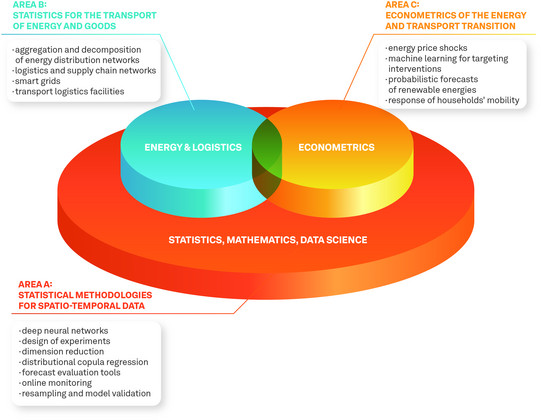Projects
TRR 391 comprises 15 research projects and three supporting projects. The research projects are organized in three cross-linked areas:
- Area A: Statistical methodologies for spatio-temporal data
- Area B: Statistics for the transport of energy and goods
- Area C: Econometrics of the energy and transport transition
Triggered by concrete applications in Area B and Area C, the projects in Area A take a general methodological perspective on the analysis of spatio-temporal data and develop broadly applicable new statistical methodology with a focus on design of experiments, high-dimensional inference, resampling, model validation, monitoring, deep learning, prediction and nonlinear modeling. The projects in Area B and Area C develop and apply tailor-made inference and data analysis tools for problems arising in the transport of energy and goods, and new econometric methodology for monitoring and guiding the transition of energy and mobility, respectively. These include more reliable strategies to control networks for the distribution of energy or goods, economic aspects arising from the transition to renewable energies, the use of more ecological and energy conserving transport, more reliable renewable energy forecasting strategies to improve supply security, and the development of models to identify the consequences of (policy) interventions.

Statistical methodologies for spatio-temporal data
The projects of Area A are motivated and triggered by the specific applications in Area B and Area C, while the general statistical methodologies for spatio-temporal data developed here will be broadly applicable for solving data analytic problems also outside TRR 391.
- A01 Optimal designs for spatio-temporal data lead by Holger Dette (Ruhr University Bochum), Kirsten Schorning (TU Dortmund University)
- A02 Space-time in high dimensions lead by Axel Bücher (Ruhr University Bochum), Andreas Groll (TU Dortmund University), Johannes Lederer (University of Hamburg)
- A03 Resampling and model validation for spatio-temporal data lead by Holger Dette (Ruhr University Bochum), Carsten Jentsch (TU Dortmund University)
- A04 Statistical monitoring of spatio-temporal processes lead by Roland Fried (TU Dortmund University), Vasyl Golosnoy (Ruhr University Bochum)
- A05 Deep learning in space and time lead by Asja Fischer (Ruhr University Bochum), Johannes Lederer (University of Hamburg), Hanna Meyer (University of Münster)
- A06 Forecasting methods for spatio-temporal data: robust evaluation and inference lead by Matei Demetrescu (TU Dortmund University), Christoph Hanck (University of Duisburg-Essen)
- A07 Distributional copula regression for space-time data lead by Holger Dette (Ruhr University Bochum), Nadja Klein (Karlsruhe Institute of Technology)
Statistics for the transport of energy and goods
Area B develops new statistical methodology for data analysis in energy supply and transport logistics, focusing on transport or distribution networks.
- B01 Statistical modeling and analysis for state estimation in electrical power distribution grids lead by Christine Müller (TU Dortmund University), Christian Rehtanz (TU Dortmund University)
- B02 Statistical methods for energy systems: aggregation and decomposition lead by Timm Faulwasser (Hamburg University of Technology), Roland Fried (TU Dortmund University)
- B03 Uncertainty quantification for decision support in transport logistics systems lead by Uwe Clausen (TU Dortmund University), Sonja Kuhnt (Fachhochschule Dortmund - University of Applied Sciences and Arts)
- B04 Real-time spatio-temporal data analysis for monitoring logistics networks lead by Paul Bürkner (TU Dortmund University), Anne Meyer (Karlsruhe Institute of Technology), Edzer Pebesma (University of Münster)
Econometrics of the energy and transport transition
Area C develops new econometric methodologies for problems arising in the context of the transition to renewable energies.
- C01 Energy price shocks: identification, transmission, and induced technological change lead by Christoph Hanck (University of Duisburg-Essen), Carsten Jentsch (TU Dortmund University), Ludger Linnemann (TU Dortmund University)
- C02 Renewable energy forecasts and their impact on electricity prices lead by Antonia Arsova (TU Dortmund University), Florian Ziel (University of Duisburg-Essen)
- C03 Monitoring of Germany’s mobility transition: data and methods lead by Matei Demetrescu (TU Dortmund University), Manuel Frondel (RWI Leibniz Institute for Economic Research Essen), Colin Vance (RWI Leibniz Institute for Economic Research Essen)
- C04 Targeting energy conservation lead by Mark Andor (RWI Leibniz Institute for Economic Research Essen), Asja Fischer (Ruhr University Bochum), Andreas Löschel (Ruhr University Bochum)
Supporting Projects
- INF Information infrastructure project lead by Philipp Breidenbach (RWI Leibniz Institute for Economic Research Essen), Paul Bürkner (TU Dortmund University), Andreas Groll (TU Dortmund University)
- MGK STAIRS - Spatio-temporal analysis interdisciplinary research school lead by Carsten Jentsch (TU Dortmund University), Kirsten Schorning (TU Dortmund University)
- Z Central administrative project lead by Roland Fried (TU Dortmund University)



